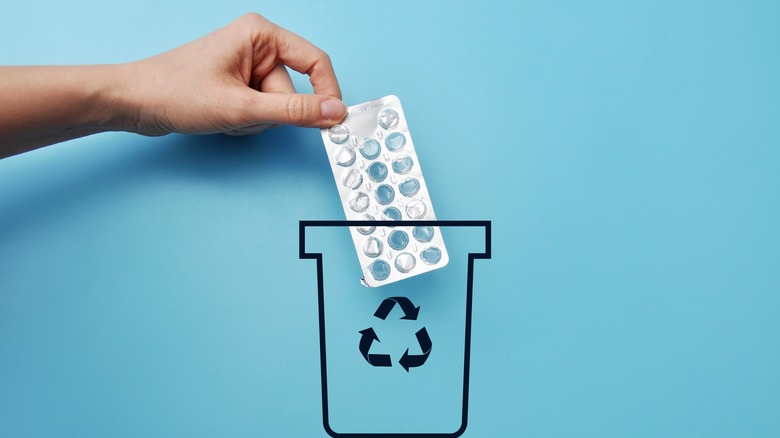Why You Should Never Take Expired Antibiotics
For many people, the expiration date on food or medications is a recommendation, not a rule. The milk is three days past expiration, but it's probably still good, right? What even happens if you take expired medication? The expiration doesn't actually represent the date the food or medication will spoil, but at what date the items have peak quality, according to WebMD. However, the expiration date on foods should still be followed closely, because the longer you wait to consume the item after the expiration date, the greater the chance of spoilage.
How does this apply to antibiotics? They are medications (not food), so does that mean the expiration date for antibiotics is also just a guideline rather than a hard rule? Turns out, it's more complicated than that. In 1979, the U.S. Food and Drug Administration (FDA) required an expiration date to be placed on prescription and over-the-counter medications. After the expiration date has passed, the risk becomes much higher that the antibiotics simply won't work.
Expired antibiotics can fail to treat infections
When it comes to expired antibiotics, many people believe they can rummage through their medicine cabinet to find old antibiotics from a previous illness. What's the point in going to the doctor if you already have the medicine on hand? Unfortunately, that antibiotic can be less effective — or not effective at all, explains the FDA. Certain expired medications can be at higher risk of developing bacteria, and antibiotics that aren't at peak quality can lead to a failed treatment. In turn, this can lead to antibiotic-resistant viruses and more severe illnesses.
Does this mean that taking an antibiotic a week past the expiration date will do you harm? Possibly not. In fact, the military has been researching this for years. They found that 90% of their drugs, both prescription and over-the-counter, were still effective 15 years after the expiration date, according to Harvard Health Publishing.
So expired antibiotics actually are effective? It depends on how much you want to risk your health. You're not the military, who needs to conserve resources. Do you want to risk consuming a 5-year-old antibiotic that may have lost its effectiveness? Probably not. In the end, it's best to play it safe and follow the FDA guidelines for disposal of expired antibiotics.
Properly dispose of your expired antibiotics
Properly disposing of your expired antibiotics does not have to be difficult. The FDA provides guidelines on proper disposal.
The best way to dispose of them is to follow the medicine's label which may include specific disposal instructions for that particular medication. If that isn't available, the next best solution is to find a drug take-back program. The Drug Enforcement Administration (DEA) provides a Collection Site locator to find the closest site that properly and safely destroys unneeded and out-of-date drugs.
If your medication doesn't have disposal instructions and there is no drug take-back site near you, it is possible to throw the antibiotics away. However, don't throw them into the trash and call it a day. Mix the antibiotics with dirt, kitty litter, coffee grounds, or similar material in a sealed plastic bag. Then you can safely throw them in the trash.
Finally, some medications should actually be flushed down the toilet instead of thrown in the trash. The FDA provides a Flush List that shares which drugs are safe to flush down the toilet.



